How to Wean Your Baby Off Their Bottle at Night

- It’s best to night wean your baby before they form a bottle habit.
- Avoiding a bedtime bottle is better for dental health.
- Age, weight, and nutritional needs determine readiness for night weaning.
- Early introduction of a regular cup can make bedtime routines without baby bottles easier.
Getting enough sleep is something all parents yearn for. If your baby still wakes for bottles during the night, I get how you feel. Knowing how to wean your baby off their night bottle is probably at the top of your priority list. Children who fall asleep on their own are a dream, but those who sleep until the sun rises again are magical!
What Is Night Weaning?
Night weaning is the process of teaching your baby not to wake up during the night to eat. Babies who are night weaned feed just before bedtime and then only when they wake in the morning again. A night weaned child is able to get sufficient nutrients from food during the day and knows how to self-soothe at night.
Weaning your baby or toddler from their bedtime bottle isn’t easy, and you should only do so if you’re sure they don’t need milk at night anymore.
Why Should Bedtime Bottles Be Avoided?
Whether your baby is breast or bottle fed, it’s best to cut nighttime feeding when you notice they only drink for comfort. Once your baby carries this habit into toddlerhood, it can be challenging to break. Here’s three reasons why it’s best to not use a bedtime bottle once your baby has learned how to sleep without a pacifier.
1. Night Bottles Can Impact Dental Health
The American Dental Association would probably say that dental health is the main reason night weaning is important, and I won’t argue! Baby teeth are more susceptible to cavities, and any type of sugar that sits on their teeth for prolonged periods can turn into acid. This can cause severe erosion that leads to decay.
Breastfed babies aren’t safe, either. Although the AAP recommends breastfeeding until your baby shows weaning cues, this doesn’t count for night feeding. Breast milk also contains sugars that could lead to tooth decay.
2. Night Feeding Can Impact Sleep Patterns
Nothing compares to the grumpiness of a toddler who didn’t get enough sleep! Don’t replace your arms with a bottle if you’re trying to get your baby to sleep without being held. Night bottles could lead to sleep issues by preventing your child from falling into their deep sleep cycle.
If children eat enough nutrients during the day, it’s unlikely they’ll wake up because of hunger. Drinking a night bottle could become nothing more than a midnight snack. Most toddlers will have trouble falling asleep again too. This can leave them cranky in the mornings.
3. Baby Bottles Can Become a Negative Sleep Association
Like always being held or having a favorite teddy, baby bottles can become a sleep association. It might seem like no big deal, but sleep associations can affect the quality of sleep your little one gets.
How and with what you put your child to bed will dictate how they learn to sleep. Your baby’s bottle could become their sleep association, causing a fuss when you don’t have it available. Buying more bottles may seem like a good preventative measure, but your baby is unlikely to wake up one day and reject their night bottle naturally. You’ll have trouble breaking this habit once it forms.

When Should the Bedtime Bottle Stop?
Older children rarely drink during the night because they’re thirsty. It’s better to leave bottles out of your bedtime routine after your baby’s first birthday. Breaking this habit after their first year could be harder.
Kids differ, and yours might be ready to drop nighttime feeding sessions earlier. You might also have to wait a little longer. But if you think your family is ready to say bye-bye to night bottles for good, consider the following factors about your little one.
- Age
- Weight
- Need
- Eating Habits
Here’s more about each to help you determine if your child is ready to start night weaning:
| Guideline | Ready | Not Ready |
| Age | Your baby is 7+ months old. | Your baby is under 6 months old and exclusively milk-fed. |
| Weight | Your baby weighs at least 14 pounds. | Your baby weighs less than 14 pounds, and your pediatrician doesn’t recommend night weaning. |
| Need | Your baby only wakes for one feeding and falls asleep immediately after. | Your baby wakes for multiple feedings that disrupt their sleep. |
| Eating Habits | Your baby has good eating habits during the day and enjoys a nutritious meal before bedtime. | Your baby doesn’t eat many solids during the day. |
If your baby shows all the good signs and there’s nothing particularly worrying about their general health, you can start night weaning. There are quite a few methods to choose from, so strap in!
How to Begin Night Weaning
Like almost all parenting decisions, night weaning is a personal one. With so many tried and tested methods, it’s clear that one size doesn’t fit all. You’ll have to find a way that works best for you and your baby. Preparing for sleep regressions and other developmental phases that can throw your progress off is also a must.
Breast and bottle fed babies will have to follow different weaning methods, but you can introduce some of these to your nighttime routine no matter how you nourish your child.
Night Weaning by Going Cold Turkey
Eliminating nighttime bottles altogether will definitely upset your toddler. If it doesn’t — lucky! This method works best for older children who can somewhat understand why you’re doing it. Going cold turkey might be your answer if they have a well-established bottle habit.
You can go about this in a few ways. The first is to make all the bottles in your house disappear. You can tell your child they’re growing up and prepare them to have a last day with their bottles. The chances are good that there’ll still be a few tears at bedtime, but preparing them and helping them understand why makes the process easier.
Another way to go cold turkey is by making them excited about what happens next. You can take your toddler shopping for “big kid” bottles and then allow them to throw the baby bottles away once you get home. A straw cup and sippy cups aren’t as comfortable to drink from while in bed, so your little one will probably ditch nighttime feedings on their own.
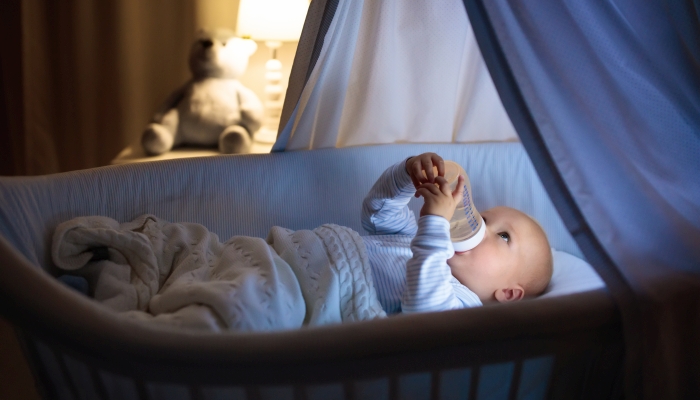
Night Weaning by Slowly Transitioning
This weaning method works great for nursing babies and those drinking several bottles per night. The idea is to gradually reduce the amount of milk your baby drinks at night while still meeting their nutritional needs. You’ll have to increase their daily intake for this to work.
Weaning Breastfed Babies: If your baby drinks breast milk, whether that’s from a bottle or through nursing, start by reducing the time they feed. You can do this by removing your breast or the bottle earlier than usual and using a settling technique until they fall asleep. If your baby drinks for 10 minutes, reduce the time to 8 minutes for two or three nights. Continue dropping their feeding time by 2 minutes every two to three nights until they stop waking.
Although cluster feeding ends around six months, your little one may still have a few phases as they go through developmental changes when they’re older. Keep this in mind while you’re dropping night feedings.
Weaning Bottle Fed Babies: Bottle fed babies are a little simpler to wean. You can wean them from their night bottle by removing a bottle every other night. It’s easier to do this if your baby can self-soothe, so I suggest working on this first. When starting your child’s bedtime routine, rely on other methods of comfort, like a warm bath or reading a book. Don’t offer a bottle. Instead, wait for them to ask.
Night Weaning by Spacing Feedings
If you wake your little one to drink during the night, you can wean them from their bottle by allowing them to sleep a little longer. Implementing a similar method during the day will make nighttime transitions easier. For a mom who follows strict routines, this may sound crazy, but sometimes following cues is the best way to approach something.
Bottle feeding less during the day will teach your toddler to not rely on their bottle for nutrition as much. The CDC approves replacing formula with other dairy sources at around 12 months. They recommend gradually transitioning, and using the “no offer” method checks that box.
If you stop offering daytime bottles, your toddler will likely drink less and eat more whole foods to keep them fueled. You can try giving more milk when your baby wakes in the morning and skipping their afternoon bottle by offering a balanced meal complemented with in-between snacks.
By the time your child falls asleep, they should be too full to empty a bottle. If you typically wake them for a feeding 4 hours after they fall asleep, see if you can stretch this time to 4 and a half or 5 hours. Slowly decrease the number of wakes you do each night and follow their cues.
Night Weaning by Replacing Bottles
Introducing regular cups during the day could help toddlers ditch their bedtime bottles. An attractive sippy cup will intrigue your child, and they may even give you the green light to throw bottles out without much work from your side. Parents who transition to regular cups during the day and use it at nap time have less trouble when removing night bottles.
Most babies are ready to use a sippy cup around 6 to 9 months. Using one early on will make it easier for toddlers to stop drinking from a bottle. If you plan on sleep training your baby, you could also leave bottles out of your routine from the start. Teaching your baby to go back to sleep by self-soothing will replace the need for a bottle.
Breaking the Nighttime Bottle Habit — Bit by Bit!
Weaning your little from their night bottle can seem daunting. Babies who rely on milk for comfort can take even more convincing than a child who uses their bedtime bottle as a sleep association. No amount of advice and tips can prepare you for the screams you may face!
Putting children to bed is a challenge on its own. If you’re like most parents, including a bottle in your bedtime routine might be what makes this easier. Although it can be hard, following advice from credible sources recommending that you ditch the bedtime bottle is wise. Your baby’s teeth and sleep quality will be better for it.
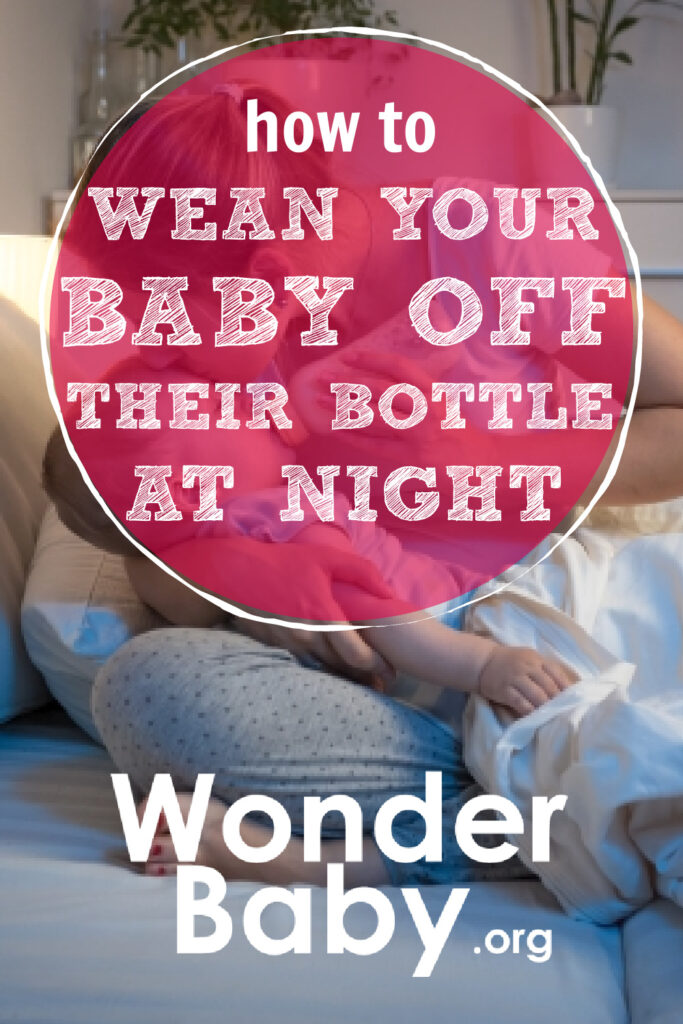
The information WonderBaby provides is not intended to be, and does not constitute, medical or other health advice or diagnosis and should not be used as such. Always consult with a qualified medical professional about your specific circumstances.
Related Posts
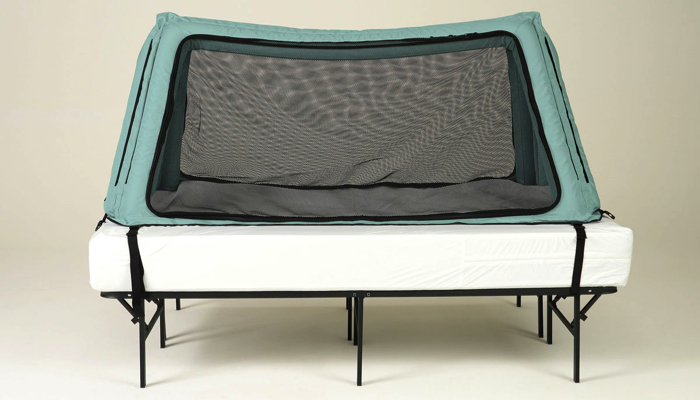
Sleep, Special Needs
Safe Place Bedding Travel Bed Review
Traveling with a special needs child can be stressful! Having a safe, durable, and easy to use travel bed can make traveling so much easier!
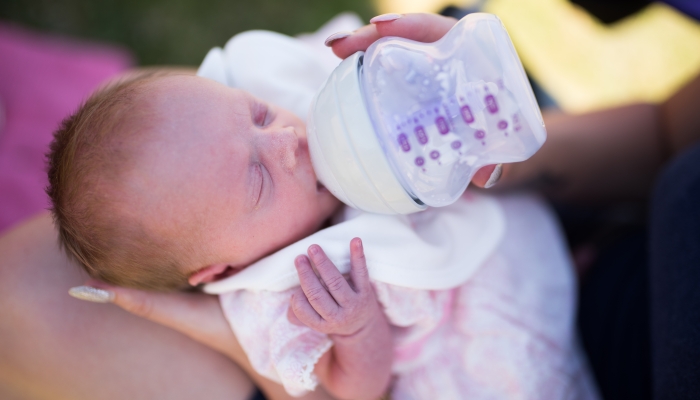
Feeding and Eating, Special Needs
Feeding Therapy Approaches for Infants with Special Needs
Many children with special needs have feeding difficulties. Working with a speech therapist, being patient, and experimenting with textures can help.
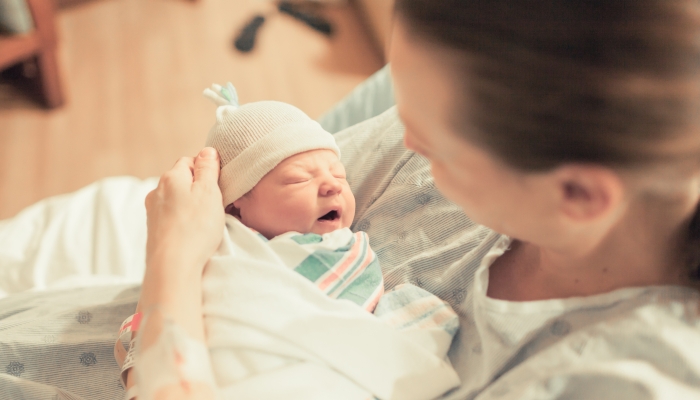
Sleep, Special Needs
Sleep Regimen for Premature Babies: Special Considerations
It can take premature babies much longer than their full-term peers to sleep for long stretches. A preemie sleep schedule may encourage better sleep.